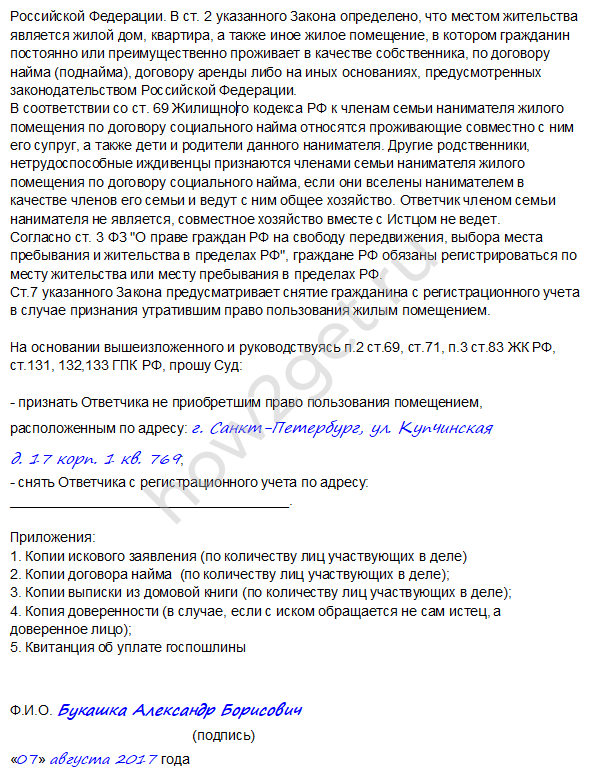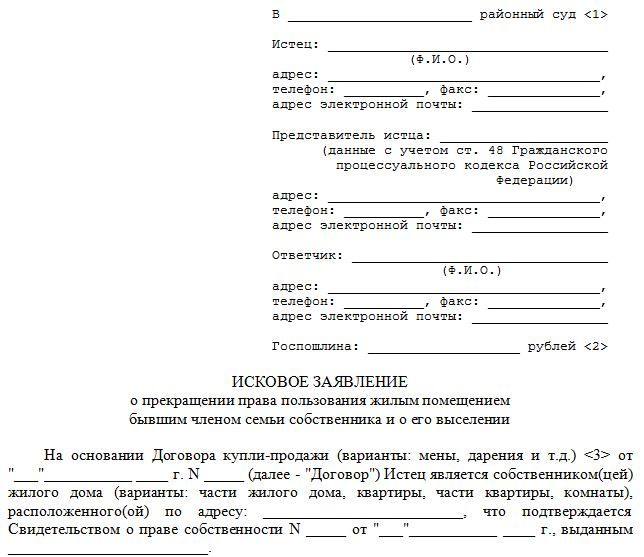How to correctly write a statement of claim for deregistration? People often find themselves in a situation where they need to deregister a person who is registered outside their apartment.
This can rarely be done on a voluntary basis. And without the consent of the citizen, government bodies refuse to carry out such actions. There is a way out; you can deprive a person of registration through the court.
The need to go to court may be caused by various circumstances. Basically, registration issues arise when it is necessary to carry out any legal actions with real estate; there are many other reasons.
How to deregister a person
No matter how events develop, deregistration at the place of residence without the citizen’s consent is permissible only after a court decision.
The complexity of this procedure depends on the specific situation. In order to discharge a person through the court, a set of certain conditions and circumstances is necessary.
Here is a list of the main ones::
- who is the owner of the property;
- who is part of the family;
- whether the defendant has other living quarters;
- does he have an alternative address at which he can carry out new registration;
- what social status do the owner of the residential premises and the citizen whose registration should be cancelled, here we mean disability, being a dependent, guardianship over someone;
- under what circumstances did he have a stamp in his passport indicating registration in this apartment;
- the age of the citizen, here we mean minor children;
- whether the citizen lives at the registration address.
Only after all the facts have been clarified, the court can make a decision to recognize the defendant as having lost the right to use the residential premises, which will be the basis for the migration service of the Russian Federation to deregister him at his previous address.
Reasons
First, you need to understand that deregistration can only be carried out by employees of the Department of Internal Affairs of the Ministry of Internal Affairs of the Russian Federation (formerly the Federal Migration Service of Russia). The court may determine that a person has lost the right to use residential premises and is subject to discharge and eviction.
It is also necessary to understand that only the judicial authority has the right to make a decision on the eviction of a person living in it from an apartment. No other government agencies are endowed with these powers, and if their representatives try to expel a tenant without a court decision, they can be held accountable for abuse of power.
| No. | Grounds for eviction |
| 1 | Expiration of the agreement on the basis of which the tenant could live in the apartment or its termination (agreement of gratuitous use, rental, etc.) |
| 2 | Another person became the owner of the home (sold, donated, etc.) |
| 3 | Maintaining an apartment in unsanitary conditions, non-payment of utilities, violation of the rights of third parties |
| 4 | Use of housing for other purposes (office, store, etc.) |
| 5 | Recognition of housing as unsafe |
| 6 | Actual long-term (more than 6 months) non-residence in the apartment |
Expert opinion
Stanislav Evseev
Lawyer. Experience 12 years. Specialization: civil, family, inheritance law.
It is also necessary to know that the greatest difficulties await the plaintiff if he wishes to write out and evict the following persons from the apartment:
- sole owner of residential premises;
- minor child;
- disabled person;
- declared incompetent by the court.
In the last three cases, it will be necessary to involve additional guardianship authorities.
What goal should you pursue?
The owner's claim for deregistration must be drawn up in such a way that the court recognizes the citizen as a person who does not have the right to use the residential premises.
This means that you will have to look for various arguments that can be used as circumstances influencing the court’s opinion.
Moreover, these arguments must be substantiated. In other words, various claims will need to be backed up with solid evidence.
To begin the trial, you need to prepare evidence and draw up a statement of claim. The form of such an appeal to the court must be in writing.
In this case, you must follow certain rules. To avoid mistakes when writing an application, you need to contact a lawyer.
When looking for grounds for expelling a person from an apartment, it is necessary to take into account the features that will follow the status of a citizen.
Most often it is necessary to deregister the following persons::
- Former family member - spouse.
- A minor child.
- Former owner of residential square meters.
- Other relatives for various reasons.
This list is not exhaustive; once again, everything depends on the specific goals and situation.
In this case, it is necessary to prepare an application for deregistration, but the correct application will sound like this - a claim for recognition as having lost the right to use residential premises.
Features of the procedure in privatized and municipal apartments
The order of discharge may also change. The reason is the fact of who owns the property, the state or a private person. Judicial practice allows a citizen to be discharged from any apartment, be it privatized or municipal.
Extract from a municipal apartment is much simpler, thanks to a larger list of reasons that can serve as a basis for going to court to forcibly evict a citizen.
The following reasons are used:
- alcoholism;
- brawl;
- use of housing for other purposes;
- damage to property;
- hooliganism.
Since the apartment belongs to the state, the plaintiff becomes the municipality or executive authority. At the same time, an application for an extract based on these reasons can apply to all family members living in state property.
If it is necessary to deregister a person from a privatized apartment, then the number of grounds for deregistration is much less. The main condition is that you can only evict a person who is not a close relative or owner.
If a registered person does not pay utility bills, this is not a condition for eviction. The only measure that can be taken is to collect the debt through the court.
Regardless of which case the lawsuit is filed in court, it is necessary to make sure that there are legal grounds for deregistration.
Circumstances required for cancellation of registration
De-registration in court involves the provision of evidence. That is, these are the arguments that the court perceives as acceptable and weighty. Among them there cannot be secondary reasons.
Let us remind you that it is necessary to prove the loss of the right to use residential premises. According to the law, family members of the apartment owner have the right to use residential premises, provided that they are registered there.
Thus, in order to remove a former spouse from registration, it is necessary to prove the severance of family ties.
Sometimes people find themselves in a situation in which it is necessary to deregister the former owner of the apartment. This happens if the alienation of real estate took place a long time ago, and privatization was involved in the transaction process.
Here the basis will be the lack of family ties and the fact that the owner has long since changed.
In relation to minor children, the law is very harsh.
In order to deregister a minor child through the court, not only grounds are needed, but also additional conditions.
The main requirement of the law in this case is the availability of new housing in which the minor can be registered, as well as the location of his parents.
In what cases is a citizen subject to forced deportation?
It is not uncommon for the deregistration of one or more residents to be accompanied by property disputes. Such situations can only be resolved within the framework of a court hearing.
To resolve the conflict between the parties, the owner of the apartment must provide the court with comprehensive evidence, which includes documented loss of the defendant’s property rights to the residential premises. The most common cases in which it is necessary to discharge tenants from an apartment by going to court:
- A person does not live in an apartment for a long time . In fact, he lives at a different address, and his apartment is only registered.
- Privatization of municipal housing . You need to formalize the transfer of state real estate into private ownership, excluding a certain person from the list of members of the privatization procedure.
- The tenant avoids financial obligations for the maintenance of housing . That is, it does not pay mandatory utility bills and taxes;
- Divorce and termination of family relations with a tenant;
- The impossibility of living together in one living space.
Extracting a person from an apartment who is not its owner is often burdened with difficulties. Typically, disputes of this kind arise among divorced spouses when one of them managed to privatize a home before marriage.
The court may refuse to satisfy the applicant's claims regarding the defendant, and a positive outcome in favor of the plaintiff often obliges him to provide his ex-spouse with another place of residence.
Having a problem? Call a lawyer:
Moscow and Moscow region (toll-free call) St. Petersburg and Leningrad region
Consideration of a case in court on deregistration at the place of residence
So, as mentioned above, you should start by filing a statement of claim. A sample claim for deregistration can be downloaded from our website.
The court then sets a date and time for the first trial.
The court calls as parties participating in the case:
- The plaintiff, as a rule, is the owner of the apartment or a responsible tenant if the housing is used under a social tenancy agreement.
- The defendant is the person who needs to be discharged from the premises.
- Prosecutor.
- The Migration Department of the Ministry of Internal Affairs of the Russian Federation (formerly the Federal Migration Service) is involved as third parties.
Witnesses are necessary in court to establish the fact of a long absence from a given address. This is another very compelling argument for discharging a person from an apartment.
After all, if he does not live there, then in principle we can assume that he has lost the right to use the housing.
Rules for drawing up and filing a claim for an extract
When filing a claim, you should take into account the jurisdiction corresponding to the district court serving the geographically located apartment. The application form for deregistration from an apartment includes:
- The header of the document indicating the details of the addressee - the district court with the exact name and legal address and personal data of the plaintiff indicating the location of the apartment and known information about the location of the defendant in case of absence from the disputed territory.
- The main narrative part describing the essence of the problem, the chronology of events regarding registration, the awareness of the resident by sending a written complaint and its subsequent ignoring, the need for discharge due to current circumstances, confirmed by documents and inviting witnesses to testify.
- The final part containing a request to satisfy the claim due to damage caused to the main tenant and other registered persons.
Samples of statements of claim for discharge from an apartment (by situation)
Statement of claim for the ex-husband's removal from the apartment: Sample application for removal from the apartment through the court. Blank (68.2 KiB, 2,025 hits)
Statement of claim to expel ex-husband from apartment. Blank (66.6 KiB, 860 hits)
Download samples: Sample claim for the discharge of a child through the court (18.9 KiB, 409 hits)
Claim for discharge from a municipal apartment (22.2 KiB, 278 hits)
Sample claim for ejectment from an apartment by a non-owner (23.6 KiB, 1,509 hits)
The form for a statement of claim for discharge from an apartment must contain a list of attachments of required documents. Partial copies are attached to the statement of claim, and the originals are presented in court proceedings.
Further actions
If events develop well, the court decides to discharge the person from the apartment. The court's decision must enter into legal force.
The law provides for a thirty-day period for this. However, this should not be the end.
Confirmation that the defendant no longer has anything to do with the residential premises will be the absence of a record about a specific person in the Form 9 certificate.
In order to achieve changes in this document, it is necessary to submit a court decision to the Federal Migration Service at the location of the apartment or house.
After completing all the necessary procedures related to notifying various authorities, you should contact the MFC. It is this organization that issues the above certificates.
As a rule, this document is ready for issue within a week. After which you can receive it and use it in the future for various legal actions.
To facilitate the plaintiff’s work, it is better to use the services of lawyers. This guarantees success.
How to discharge a person through court
In order to be able to deregister a person without his consent, it is necessary to obtain a corresponding resolution.
To get the required answer, you must:
- Go to the magistrate's court located at the place of registration of the applicant, or at the location of the house or apartment.
- Draw up a claim stating the reasons why the defendant must leave the living space and deregister. The claim is filed in three copies: for the court, for the plaintiff, for the defendant.
- To accept a claim, you must attach a receipt for payment of legal costs.
- Submit the documents required for discharge.
The plaintiff must independently notify the defendant of his application to the court in order to discharge the citizen. It is best to obtain evidence that there were attempts to convey information.
To do this, send the original statement of claim if the current address of residence is known (the claim must be sent by registered mail with notification), or provide a complete package of documents in hand if there is a possibility of a personal meeting. For additional evidence, you can bring witnesses with you.
The court requires the following documents:
- a copy of the plaintiff's passport;
- a copy of the house register (all pages are required);
- copies of documents confirming the plaintiff’s right to property;
- if you need to write out your ex-spouse, it is advisable to attach a copy of the divorce certificate;
- extract from the Unified State Register.
Sample statement of claim to the court for removal from a municipal apartment:
Where to contact
Going to court is necessary so that the owner of the living space can obtain a document that allows the citizen registered in this property to be discharged. To remove the registration, you must go with a court order to the FMS, where the person will be discharged according to the standard procedure.
To apply, you must go to the magistrate at the place of registration of the applicant or at the location of the property (the object of the dispute). The time for consideration of the claim will be determined at the time of filing.
Form and example of a statement of claim
In order for the court not only to accept the application, but also to help achieve justice, it is necessary to provide evidence to the words. Documents that will help to discharge a citizen can be any papers proving his illegal presence, going against the wishes of the plaintiff. The filing rules and deadline are regulated by the Code of Civil Procedure of the Russian Federation.
Documents for registration in the owner's apartment do not need to be collected if there is no consent in paper form from the owner of the property. Read also how to get a cash loan for military personnel without permanent registration.
The application is submitted indicating the following information:
- name of the judicial authority;
- details and address of the plaintiff;
- details and address of the defendant;
- purpose and subject of appeal;
- reasons or circumstances on the basis of which the defendant must leave the living space;
- a list of requirements with precise wording;
- all documents that are evidence of the words and point of view of the plaintiff are attached;
- departure date;
- applicant's signature.
If a citizen is registered in an apartment or house on a temporary basis, but it is necessary to evict the person ahead of schedule, then it is also necessary to go to court.
For a positive outcome, you must attach documents that will serve as a motivating reason for eviction. In order for the court to be sure that the apartment belongs to the plaintiff, documents proving the right to own the apartment are also attached.
To evict a citizen registered on a permanent basis, grounds and documents confirming the right to property are required. You can always invite the defendant to discharge himself, providing the opportunity to register on a temporary basis in another place of residence. A temporary registration form is attached for this purpose.
Sample statement of claim to the court for removal from the apartment of the ex-spouse:
Cost and time frame of the procedure
An extract from the property for the plaintiff will cost 200 rubles, which must be paid as a state fee. If a claim is filed against several people at once, then a fee will have to be paid for each citizen.
If a legal entity goes to court, the state duty increases to 700 rubles. To this amount are added the costs of making copies, notarization and attorney fees. How much a copy and other expenses cost depends on your region of residence.
The claim is accepted within five days, and is considered up to two months. It takes so much time to consider the application and search for the truth. If the court decision has not been appealed, then the documents can be submitted to the FMS.
The FMS requires fourteen days to discharge a person by court decision. There are often cases when the process was delayed up to one month, but this is only possible if the citizen is independently discharged. After deregistration, the defendant will be given a departure slip and a corresponding note will be made in the passport.

Form of claim for discharge from the apartment through the child's court
Deregistration: judicial practice
Property owners and family members of the defendant (if we are talking about a municipal apartment) file claims in district courts. An application to court may even contain several related demands. These include eviction and loss of use of housing.
Judicial precedents indicate that courts do not satisfy the requirement to cancel registration as such. They are limited to resolving the issue regarding the regime of living quarters.
The fact is that, according to the legislation of the Russian Federation, the basis for deregistering a person is a decision to evict him or to recognize him as having lost the right to use specific real estate.
This is what the judges focus on. Below is an overview of several controversies. It will help you correctly identify the arguments for going to court.
Absence of a citizen at the place of residence
Citizen Petrova (surname changed) went to court to the defendant with demands to recognize her as having terminated the right to use the residential premises and to cancel her registration.
In the lawsuit, Petrova explained that she and Dmitriev (last name changed) lived together for several months in her own house in a civil marriage.
Petrova registered Dmitriev at her address. However, after some time, he left with all his belongings in an unknown direction.
Having studied the materials provided and interviewed the summoned witnesses, the Yeletsky District Court of the Lipetsk Region, by its decision dated September 28, 2018, case No. 2-511/2018, satisfied the claims in full.
Regarding the former residents, the judge indicated that the presence of the defendant’s registration in the owner’s house infringes on his rights. The operative part of the decision states that termination of the right to use residential space is grounds for deregistration.
Eviction from the apartment
If the court decides to evict a citizen from the occupied property, this is automatically grounds for removing the person from registration with the Federal Migration Service. Special attention is not paid to the issues of further registration in the operative part.
The enterprise filed a claim against the defendant for eviction. It is the owner of the apartment, which was acquired in the process of foreclosure on the mortgaged property. However, the former debtor remained living there, despite a written demand to vacate the property.
The Zeltsovsky District Court of Novosibirsk upheld the claim. The decision of September 28, 2018 in case No. 2-2777/2018 states that if a citizen does not leave the residential premises at the request of the owner, he is subject to eviction based on a court decision. It is an unconditional basis for canceling registration.
Termination of the right to use residential premises
When a stranger is registered in an apartment or the owner’s house, but does not live there, he can be discharged by court decision. To do this, it is enough that the loss of the right to use housing is confirmed.
As an example, we can cite the decision of the Dinsky District Court of the Krasnodar Territory dated September 28, 2018, case No. 2-2839/2018 . The plaintiff is the owner of a residential building. The defendant is legally registered there, but has never actually lived there.
In upholding the claim, the court indicated that the opponent is not a relative of the owner of the house, does not live there and has not entered into any rental agreements.
In addition, emphasis is placed on the fact that the cancellation of a citizen’s registration is carried out on the basis of a court decision on deprivation of the opportunity to use housing.
Extract from former spouse
Citizen Popov appealed to the court with a demand to deregister his ex-wife and son. At the same time, he asked to recognize them as having lost the right to use housing. The statement of claim is justified by the fact that the defendants moved for permanent residence to another country.
Having considered the demands, the Central District Court of Simferopol, by decision of September 28, 2020 in case No. 2-2316/18, partially satisfied the claim. He terminated the right to use residential premises for his ex-wife. The rest was rejected.
The judge motivated him with the following arguments. The child is a minor and his place of residence is determined by his parents at the disputed address. Due to his age, he cannot make independent decisions about his territory of residence.
As for cancellation of registration, it cannot be an independent requirement of the claim. The procedure depends on the court’s decision on the defendant’s housing rights.
Where to start the statement
If the residential premises are owned, legal relations are regulated by civil law. Rights and obligations regarding municipal housing are established by the Housing Code. And if the question concerns former spouses, the norms of family law will also have to be taken into account.
Depending on the status of housing and the current situation, citizens often combine such claims with other claims - for eviction, for recognizing the defendant as having lost the right to use the premises, etc. It depends on how correctly you indicate the reason why you are interested in the sample claim Application to the court for deregistration depends on whether the court will satisfy your claim or not. When the owner discharges a minor, difficulties arise, and the judge involves the guardianship authorities. Even before going to court, clearly decide what you want and how you will prove your position. If you are at a loss, contact a lawyer. He will help you find the right legal basis, draw up a claim and collect evidence.
| In _______________________ district court Plaintiff: ______________________________ (full name of the owner of the residential premises) address: ______________________________, telephone: __________, fax: __________, email address: _____________ Respondent: ____________________________ (full name) address: ______________________________, telephone: __________, fax: __________, email address: _____________ State duty: _______________ rubles Statement of claim for deregistration (2020 sample) The plaintiff is the owner of a residential premises (apartment) located at the address: ________________, cadastral number _______, as confirmed by the entry in the Unified State Register of Real Estate dated “___”________ ____, No. ___. The defendant, who is not the owner of this residential premises, is registered together with the plaintiff in this residential premises. The plaintiff can no longer live together with the defendant due to _____________________________, as confirmed by ________________________. The plaintiff's claim dated "___"____________. No.___ the defendant did not voluntarily satisfy the request for vacating the occupied residential premises, leaving it without an answer, which is confirmed by ___________________________. Based on the above and guided by Art. ___ Housing Code of the Russian Federation, Art. Art. 131, 132 of the Civil Procedure Code of the Russian Federation, I ask you to evict the defendant from the occupied residential premises located at the address: ________________________________, which is the property of the plaintiff. Applications:
Date, plaintiff's signature |
Here is an example of a completed application for deregistration in 2020:

How to file a claim
Having received the claim, a representative of the authorized body will check the document for compliance with the established requirements. There should be no errors. If the rules are not followed, the claim will be rejected. Therefore, it is important to act wisely.
A claim can be filed by contacting a lawyer. A specialist will professionally prepare the document. However, you will have to pay to perform the actions.
An alternative is to prepare the document yourself. The method will minimize costs. However, no one guarantees that the paper will be drawn up correctly. To minimize the risk of errors, it is recommended to follow a number of rules. The document must contain the following mandatory information:
- Name of the court to which the appeal is filed.
- Information about all participants in the process. It is important to reflect information about the plaintiff and defendant, as well as third parties. You will need to provide your full name, residential address, and information for operational communication.
- Document's name. Located in the center.
- Reasons for contacting. It is recommended to describe the current situation. Information should be dry. You cannot be emotional and stoop to insults. It is necessary to provide links to the legislative framework.
- List of put forward requirements.
- List of documentation serving as an appendix to the application.
- Date and signature. The document is drawn up according to the number of participants in the proceedings. It is better to use a ready-made sample.
This is important to know: Collection of alimony from a foreign citizen
Grounds for deregistration through court
The statement of claim must contain the basis for deregistration. Just the owner's desire is not enough. Among the main reasons that may be accepted by the court:
- The person registered in the living space has moved out and does not live there. In this case, the right to use is deprived.
- The spouses have divorced or the parents have been deprived of parental rights. In this case, they are already former family members. In the case of former spouses, the list of documents must include a birth certificate.
- The tenant is voluntarily absent, that is, he has moved out and does not object to the cessation of use of the housing.
- Housing and communal services debt. If a temporarily registered tenant does not pay payments, does not carry out repairs, thereby creating a threat to the premises and violating the interests of the owner.
- Infringement of the rights and interests of neighbors. Immoral behavior in social housing may prompt those same neighbors to go to court.
- Property For Sale.
- Eviction from foreclosed property. Discharge is possible only if this is not the person’s only home.
- Deregistration if the apartment used as collateral was transferred to the creditor.
- If it comes to a municipal apartment, then the dilapidation of the building may serve as the basis. At the same time, discharged residents must be provided with another room.
The privatization deadline is reviewed regularly. This is precisely why many became alarmed and decided to privatize their property. No one needs to have “unnecessary” persons registered at the time of registration, because they will claim part of the apartment. In addition, written permission must be obtained from everyone registered. If an attempt is made to deregister a minor child, then the law is very harsh. In addition to the grounds, additional conditions must be met. The main thing is the provision of similar housing in which the child can be registered. The location of the parents is also taken into account.
Arbitrage practice
The practice of conducting such cases is extensive. Often, discharge still occurs in the following cases:
- The person being discharged is not a member of the plaintiff's family.
- The defendant moved out of the apartment or did not live at all.
- The citizen has a new family and he has a place to live.
Citizen A. applied to the court to recognize that his son P had terminated the right to use the apartment. He had previously been moved in and registered, but had not lived with his father for a day. Since 2 people are registered, utility bills are calculated for two according to the tariff. These expenses are too burdensome for a pensioner. P.'s son actually lives elsewhere. The basis for my son’s discharge was Art. 83 Housing Code of the Russian Federation. The claim was granted.










